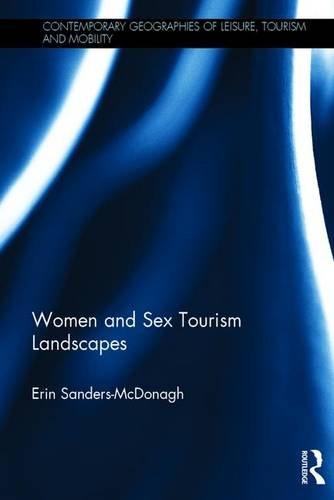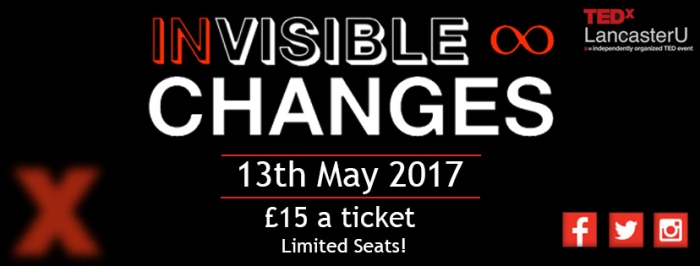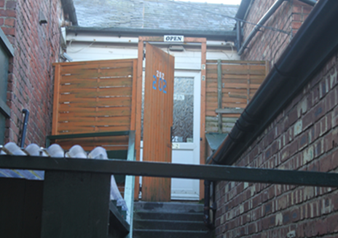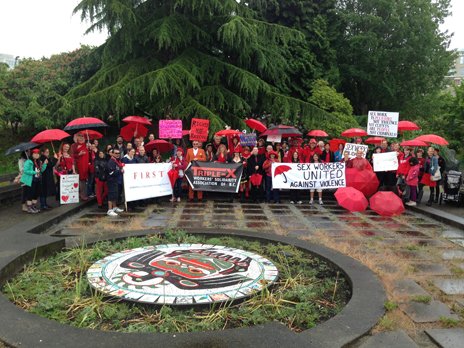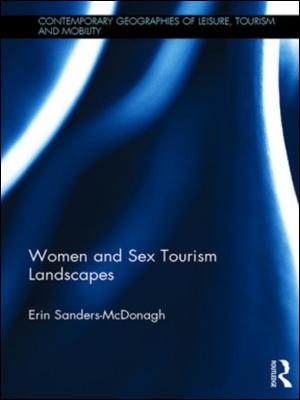
We (Paul Maginn and Erin Sanders-McDonagh) are pleased to announce our special session at this year’s AAG annual meeting, which is part of the Mainstreaming Human Rights in Geography and the AAG featured theme and also sponsored by the Sexuality and Space Specialty Group. Please find below the session details and paper titles but I am also taking this opportunity to promote the fantastic new book by Erin: Women and Sex Tourism Landscapes (published by Routledge) which compares female tourists’ interactions in highly sexualised spaces in Thailand and the Netherlands. Feel free to ask Erin about this during our sessions!
____________________________________________________________________________________________
1606. (De)Stigmatising Sexscapes: Politics, Policy and Performance I: Porn, Pleasure & Performance (Sponsored by Sexuality and Space Specialty Group)
Room: Room 107, Hynes, Plaza Level (Paper Session)
Wednesday April 5th, 4:40 pm – 6:20 pm
ORGANIZER(S): Paul J. Maginn, University of Western Australia; Emily Cooper, University of Central Lancashire; Erin Sanders-McDonagh, Middlesex University
CHAIR(S): Paul J. Maginn, University of Western Australia
4:40 Gemma Commane, Dr*, Birmingham City University, Kinktrepreneurship and social media: debates, rights and female subjectivity.
5:05 Joanne Bowring*, Liverpool John Moores University, Stigma in the UK Adult Film Industry.
5:30 Jennifer Heineman, PhD*, University of Nebraska at Omaha, Performing the Whore, Performing the Academic.
5:55 Emily Meyer, Esq.*, University of Cincinnati, The Cam Model: Kinship, Community, and Intimacy.
____________________________________________________________________________________________
2106. (De)Stigmatising Sexscapes: Politics, Policy and Performance II: 2. Rights, Wrongs and Regulations (Sponsored by Sexuality and Space Specialty Group)
Room: Room 107, Hynes, Plaza Level (Paper Session)
Thursday April 6th, 8:00 am – 9:40 am
ORGANIZER(S): Paul J. Maginn, University of Western Australia; Emily Cooper, University of Central Lancashire; Erin Sanders-McDonagh, Middlesex University
CHAIR(S): Emily Cooper, University of Central Lancashire
8:00 Laura Graham*, Durham University, The Home Affairs Select Committee Inquiry on Prostitution: Is the time ripe for a Human Rights based approach to sex work?
8:25 Emilia Ljungberg*, Karlstad University, The smiling face of the emotional state.
8:50 Elena Shih*, Brown University; Christine Shio Lim, Brown University; Jordan Rubin-McGregor, Brown University; Imani Herring, Brown University, Building a Movement Against Sex Work in Rhode Island: Anti-Trafficking and Academic Industrial Complexes.
9:15 Billie M Lister, Doctor*, Leeds Beckett University, Time for change? : Indoor sex workers experiences of working under quasi-criminalisation in England and Wales and their ideas for legislative change.
____________________________________________________________________________________________
2206. (De)Stigmatising Sexscapes: Politics, Policy and Performance III: 3. Governance, Policing and Design (Sponsored by Sexuality and Space Specialty Group)
Room: Room 107, Hynes, Plaza Level (Paper Session)
Thursday April 6th, 10:00 am – 11:40 am
ORGANIZER(S): Paul J. Maginn, University of Western Australia; Emily Cooper, University of Central Lancashire; Erin Sanders-McDonagh, Middlesex University
CHAIR(S): Gemma Commane, Birmingham City University
10:00 Nicole Kalms*, Monash University, Sex Shop / Pole Dance / Street Work: Heteronormative Architectures of the Neoliberal City.
10:25 Erin Sanders-McDonagh*, University of Kent, Pushing sex work to the margins: The sanitization of Red Light Districts in Amsterdam and London.
10:50 Paul J. Maginn*, University of Western Australia; Emily Cooper, University of Central Lancashire, On-street, Off-street, And Online: The Dynamic Liminalities Of Sex Work.
11:15 Alison Better*, Kingsborough Community College, CUNY, Constructing Space and Community for Sexual and Gender Exploration at Sex Toy Boutiques
____________________________________________________________________________________________
2406. (De)Stigmatising Sexscapes: Politics, Policy and Performance IV: 4. Production, Consumption and Reflection (Sponsored by Sexuality and Space Specialty Group)
Room: Room 107, Hynes, Plaza Level (Paper Session)
ORGANIZER(S): Paul J. Maginn, University of Western Australia; Emily Cooper, University of Central Lancashire; Erin Sanders-McDonagh, Middlesex University
CHAIR(S): Emily Cooper, University of Central Lancashire
Thursday April 6th, 1:20 pm – 3:00 pm
1:20 Yo-Hsin Yang*, Negotiating/resisting stigma of sexscapes: gay men’s sex moral performances on tour.
1:40 Victor Trofimov*, European University Viadrina, From commercial sex to homonormativity: changing landscape of male street sex work in Berlin.
2:00 Katharine Parker*, Northumbria University, Public Sex Environments in Contemporary Sexscapes: A Case Study from North East England.
2:20 Nick McGlynn*, University of Brighton, Too Fat, Too Thin, Just Right?: Stigmatised Bodies in Bear Spaces.
2:40 Philip Birch*, Western Sydney University, Prostitution and Procuring Sexual Services: Why men buy sex .
____________________________________________________________________________________________2506. (De)Stigmatising Sexscapes: Politics, Policy and Performance V: 5. Mobilities, Immobilities and Boundaries (Sponsored by Sexuality and Space Specialty Group)
Room: Room 107, Hynes, Plaza Level (Paper Session)
Thursday April 6th, 3:20 pm – 5:00 pm
ORGANIZER(S): Paul J. Maginn, University of Western Australia; Emily Cooper, University of Central Lancashire; Erin Sanders-McDonagh, Middlesex University
CHAIR(S): Erin Sanders-McDonagh, Middlesex University
3:20 Rachel Wotton*, Sex workers who provide services to clients with disability.
3:45 Alison J. Lynch, J.D., M.A.*, Associate Instructor, Mental Disability Law and Policy Associates, Sexuality, Disability and the Law: Beyond the Last Frontier?
4:10 Bella Robinson*, CoyoteRI; Elena Shih, Brown University, Policing Modern Day Slavery: Sex Work and the Carceral State in Rhode Island.
4:35 Laura Connelly, Dr*, University of Salford, Caring for and controlling the subaltern body: Politics, policy and practice within a rescue industry.
____________________________________________________________________________________________
I will be hopefully writing up a blog post after the sessions as usual for those who cannot make it. Please follow the hashtag #geosex17 and #aag2017 for live tweets!


